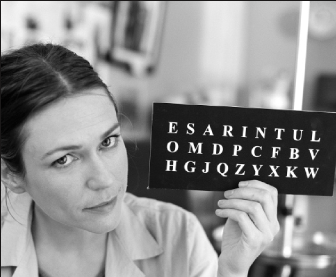By Jerry Tallmer
That was Jean-Dominique Bauby’s passport back into communicable life. Well, not life exactly, but existence. The letters of the alphabet ranked according to the frequency with which they start words in French. Plus the one muscle in his whole body that the paralyzed Bauby could still move, the muscle that enabled him to blink his left eyelid — once for Yes, twice for No — in converse with doctors, nurses, and the rest of the world. Pray God you never need a passport like that, in any language.
For two and a half weeks after he’d agreed to write the screenplay of “The Diving Bell and the Butterfly,” a film to be made from Bauby’s so-titled best-selling eye-blinked memoir, Ronald Harwood was as trapped, as locked in, as Jean-Dominique Bauby himself. And Jean-Dominique — “Jean-Do” to his colleagues and family — was then eight years already dead, following the massive 1995 stroke at age 43 that had turned the editor-in-chief of Elle magazine into — as he overhears — “a vegetable.”
“A vegetable?” is Jean-Do’s response. “A cucumber? A carrot?”
It was that kind of spunk, that kind of wit, that immediately appealed to playwright and Oscar-winning screenwriter Harwood, whose wife Natasha said: “You must read this” had handed him Bauby’s slim, short (130 pages), stunning reverie.
“There’s no self-pity in it at all,” Harwood said, here in New York the other day, having been flown in from London for the film’s opening this Friday at the Angelika and Lincoln Plaza. “Anger, yes, but amused anger.”
Another sample: At the Naval Hospital at Berck-sur-Mer, in a Proustian landscape near Calais, where Bauby is being brought back millimeter-by-millimeter into, so to speak, the fellowship of man (better yet, womankind — nurses, therapists, lovers, the unmarried mother of his children), the patient is informed one day: “You are now good for a wheelchair.”
“What a verdict!” we hear him say. To himself, of course, because, as a 99,9999 percent victim of “locked-in-syndrome,” Jean-Dominique Bauby cannot actually talk except to himself.
“So I read the book,” said Harwood, “and when [producer] Kathleen Kennedy called to ask: ‘Would you be interested?,’ I said yes, without rereading it.
“And then I was very stuck. For two and a half weeks I was stuck. Until I finally came up with the idea: He, Bauby, should be the camera.”
And so it is, for the first 8 or 10 or 12 minutes of the film: a blurred, aquarium-like, stroke-victim’s-eye view of a world — stretchers, hospital, doctors, other doctors, medical machinery, crisis, verdicts, procedures — that slowly, slowly congeals into articulated shapes and narrative intelligence. That the director of all this is Jullian Schnabel, who before he made movies painted paintings that looked like movies, fits right in.
“What it did was put the audience in Bauby’s place. Once I had that idea,” said the Harwood whose work we in America best know extends from “The Dresser” (1983) to Polansky’s “The Pianist” (2002), “it was off to the races.” We never in fact see Jean-Do — which is to say actor Matthieu Amalric — fully face-to-twisted-face until deep into the movie.
No, Harwood didn’t do any real research.
“What I did do was meet with the mother of his two children, who introduced me to the therapist who developed the alphabet of most frequently used letters in French.”
All that spelling and blinking and “dictating” (so to speak) to the young woman who has to make sense of it (Claude Mendibil, played by Anne Consigny) was clearly a horrendously slow process.
“Yes, but after a while he could start with a few letters and she could guess the whole word.”
A very nice star turn is by that grand old man of films, Max Von Sydow, who broke upon us so stunningly as the tall, iceberg-handsome knight playing chess with Death in Ingmar Bergman’s “The Seventh Seal,” back in 1968. Here he is Jean-Do’s old and ailing father, first seen in flashback to when his son is giving him a shave. When he growls: “I’ve had more affairs than anyone except perhaps Casanova” and then, looking in a mirror: “They don’t make them like me any more,” I suddenly remember his “Wild Strawberries” costar Ingrid Thulin’s long-ago giggle on being informed that Von Sydow had just been signed to play Jesus in “The Greatest Story Ever Told.”
But harsh reality returns when, at his son’s bedside in this other movie, Jean-Do’s papa further growls: “You try four flights of steps when you’re 92 [Von Sydow is 68]. We’re both locked in.”
“I’ll tell you one thing,” said Ronald Harwood. “In my long career, Max Von Sydow did what no other actor I’ve ever known has done. I met him for the first time a few days ago. He said: ‘Thank you for your screenplay.’ ”
And that line of Von Sydow’s as he looks in the mirror? “I’m afraid that’s me,” said a smiling Harwood.
At the moment, as a South African-born, London-dwelling member of WGA, the Writers’ Guild of America, Ronald Harwood is unemployed — that is, on strike — Hollywood-wise. But the man who, among other things, wrote “Taking Sides,” about wibbly-wobbly conductor Wilhelm Furtwangler in Hitler Germany, has two more plays coming about collaboration and collaborators, one about John Amery, hanged for treason as a broadcaster from that same Germany, and one about Richard Strauss and Stefan Zweig.
Jean-Dominique Dauby’s only collaboration was with death. It took him away two days after the 1997 publication by Editions Robert Laffont, Paris, of “Le Scaphandre et le Papillon.” A-u r-e-v-o-i-r, J-e-a-n D-o.





































